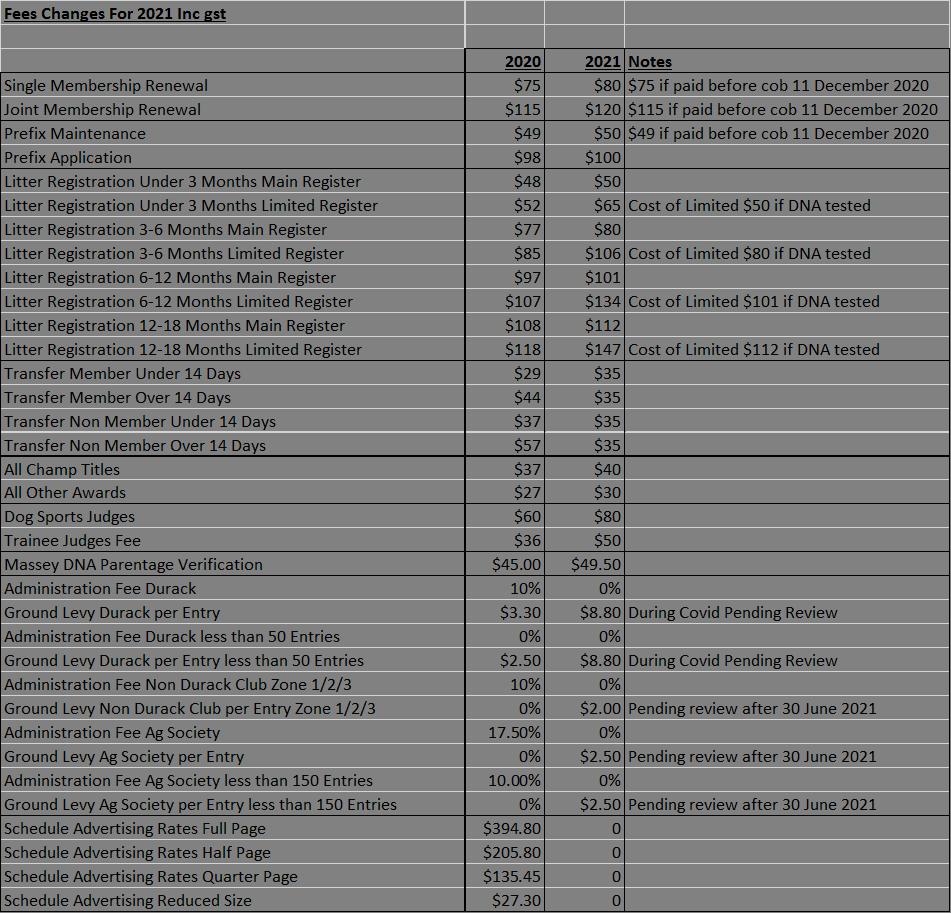
21 minute read
Board Notes
2021 FEES
In setting the Fees for 2021, the Board looked at the uncertainty that still exists with the COVID Pandemic continuing into 2021 and endeavoured to keep any fee increases to an absolute minimum. The fees around events are now set for 2021 also.
The following changed fees have been agreed upon and are effective for all applications received in the Dogs Queensland office after 1 January 2021. I would make the following notes; • Litter Registration Fees have increased minimally for Main Register Dogs. The Board has also made the cost of the Limited Register the same as the Main Register if the pup is DNA tested at the time of registration. • The Transfer cost is now standardised to take away the confusion of 4 separate Transfer Fees. • Title and Award Fees have again increased minimally. • Massey DNA Costs has been brought into line with those of other providers. • For Events held post 1 January 2021, a levy will replace the existing administration fee and schedule advertising fee.
As an overview for 2020, we received 3302 Litters in the Office, of these Litters 57% were submitted incomplete or incorrectly requiring written contact with the breeder from the Office. Examples include but are not limited to the following; • Missing Credit Card Information • Limited Register Form Errors • Membership and Ownership issues • Missing Forms, ie Colour Verification, Certificate of Fitness, AI Forms • Signatures of Breeders or Stud Dog Owners • Missing or Incorrect Microchip Numbers • Orivet DNA Parentage Certificate Errors Of the 57% of sendbacks, approximately half of these were due to incomplete or missing DNA information. The Board acted earlier in the year to extend the cheaper registration deadline form 3 months to 4 months and this will be kept in place to allow breeders more time to complete the DNA Parentage Verification prior to submission.
The Board has taken note of these send back rates and noted the extra workload placed on the Office and has agreed that from 1st March, any litter received in the Office that requires further written contact with the breeder will incur a $10 handling fee.
APPROVAL OF 2020 NATIONAL SHOW APPLICATION: BEAGLE CLUB OF QUEENSLAND – RESCHEDULED TO 2021 DUE TO COVID-19
Please note we have received advice from the Beagle Club of Queensland via Dogs Queensland that the 2021 National Show they were to conduct on 5 to 7 August 2021 is to be indefinitely postponed due to the potential for ongoing implementation of COVID-19 government health measures and the risk of hard border closures affecting Judges and interstate exhibitors.
APPROVAL OF 2021 NATIONAL SHOW/ RESTRICTED TRIALS: GERMAN SHORTHAIRED POINTER SOCIETY (NSW) INC – CHANGE OF DATE
The ANKC in referring to their email below (in italics) advise a change of date of this National Show/ Restricted Trials to be conducted by the German Shorthaired Pointer Society (NSW) Inc.
The new dates for this event will be 6 to 8 April 2022 We are pleased to advise the approval of the application received from the German Shorthaired Pointer Society (NSW) Inc via DOGS NSW for their 2021 National Show to be held on 25 & 26 March 2021 with a Restricted Obedience & Rally Obedience Trials on 24 March 2021 to be held at the Bill Spilstead Complex for Canine Affairs, 44 Luddenham Road, Orchard Hills, New South Wales. The RAS of NSW has confirmed these dates will not clash with the breed judging at the 2021 Sydney Royal Show.
APPROVAL OF 2021 NATIONAL SHOW/ RESTRICTED TRIALS: SHETLAND SHEEPDOG CLUB OF NSW – CHANGE OF DATE
The ANKC in referring to their email below (in italics) also advises a change of date for this National Show/ Restricted Trial to be conducted by the Shetland Sheepdog Club of NSW.
The new dates for this event will be 20 & 21 April 2022 at the same venue being Dogs NSW Showgrounds, Orchard Hills, New South Wales. The Club has confirmed the RAS has acknowledged these national dates however this approval is subject to the Club providing written confirmation from the RAS these dates will not clash with the breed judging at the 2022 Sydney Royal Show once the RAS has commenced their schedule of planning for 2022. We are pleased to advise the approval of the application received from the Shetland Sheepdog Club of NSW via Dogs NSW for their 2021 National Show with Restricted to Breed Obedience & Rally Obedience trial to be held on 31 August & 1 September 2021 at the Bill Spilstead Complex for Canine Affairs, 44 Luddenham Road, Orchard Hills, New South Wales.
TORNJAK RECLASSIFICATION
The National Breed Standards Coordination Group has considered a request for the reclassification of the Tornjak from Group 5 to Group 6.
The Group has noted and agreed that as the Tornjak is an FCI breed which has been allocated by its registering body and country of origin into FCI Group 2.2 which covers all the mountain dwelling Livestock Guardian breeds such as the Pyrenean Mountain Dog, Caucasian Shepherd Dog, Central Asian Shepherd Dog and the Kangal which are normally placed in our Group 6, they have agreed to the request.
As a result this breed will now be moved from Group 5 to Group 6.
Breed Feature
THE POODLE
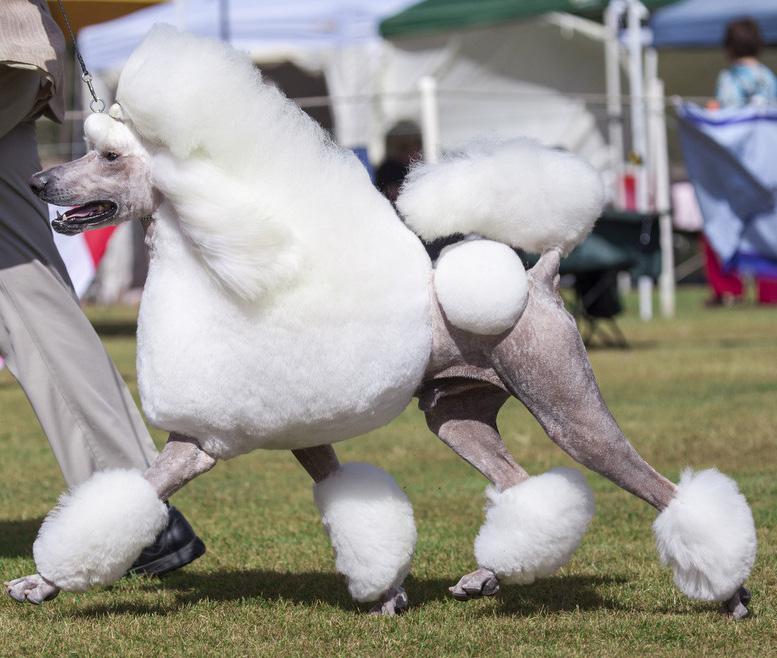
SO YOU WANT TO OWN A POODLE
The basic areas to explore when planning to purchase a Poodle are:
The Breeder – Registered / reputable / recommended / will they mentor you?
Variety – Consider expense, size, your situation, family, holidays etc.
The Vet – your new best friend. Accommodation – safe, secure, clean, comfortable and weatherproof.
Food – no fads, just basic good nutrition for physical fitness.
Exercise – socialization at first, more physical exercise as the puppy matures then daily commitment.
Grooming routines – after puppy training 5
Training – early puppy training in particular involves a time commitment by you. Use your local Obedience Club (check the Dogs Queensland website www.dogsqueensland.org.au).
Companionship – your Poodle is a friend, not an accessory.
HISTORY
The Poodle’s origins can be found mainly in Germany, France and Russia. The word Poodle derives from the German word ‘Pudel’ meaning to splash in water. Appearing in European art from the fifteenth century (1400’s), Poodles became the national dog of France and a popular companion dog. Poodle Clubs were formed in the United Kingdom in 1876, in the USA in 1931 and in New South Wales in 1955.
Did you know Winston Churchill owned a Miniature Poodle called ‘Rufus’? Standard Poodles are the largest of the breed and were bred as water retrievers. The thick coat and the traditional trims reflect the practical requirements of retrieving in cold European waters.
Miniature and Toy Poodles were developed over the centuries as companions, circus and street performers, and for searching out truffles – the mushroom-like fungus used in gourmet cooking. In Australia Poodles performed in circuses on the gold fields in the nineteenth century. Poodles first appeared in a show catalogue at the Sydney Royal Easter Show of 1873. At first all Poodles were shown as ‘Standards’. The first classification of a Miniature Poodle at a Sydney Royal Easter Show occurred in 1950. Toy Poodles are now extremely popular.
FINDING A POODLE
Research the breed – this can’t be stressed hard enough. Poodles do think they are humans on 4 paws and will own you, not vice versa! They are a very intelligent breed and crave companionship. Research the breeder, find those that breed the size you want and get a recommendation from someone who knows the breed.
Avoid cross breed dogs despite the stories you will hear. Crossing poodles with other breeds only serves to create genetic time bombs – • shorten life spans, • often leads to early blindness, heart and limb problems, • poor temperaments and • often other serious problems, as well as huge vet bills – definitely not what you want in a poodle.
A reputable poodle breeder will have good lines in their breeding, usually stick to one or two solid colours and can show you genetic test results. Often they will have all their breeding stock to view and can show you previous litter information to give you a better idea of size, colour and look of the pup. Their pups will be robust, healthy, have an excellent temperament, come from good size litters and give you a positive, passionate vibe for their dogs. They will also be supportive in your choices and offer after sales support and be professional with all dealings with you.
SUITABILITY WITH CHILDREN
All dogs require responsible training and socialization to become good companions. Poodles of all sizes are suitable to be around children as long as supervised by a responsible adult. Children should also be provided with advice so they can learn about the needs of the dog and be aware of basic handling requirements. It is important children remain calm around dogs and young children may require additional supervision. Toy Poodles are small dogs and may require extra care to avoid injury from active, boisterous children. Standard Poodles are large dogs and young children cannot be expected to take responsibility for them.
EXERCISE REQUIREMENTS
Can you commit? Adult Standard Poodles benefit from regular, moderately vigorous outside exercise and stimulation. However, puppy outings (after 12-weeks of age) should be primarily for experience and socialization, and care should be taken not to over-exercise the pup. The smaller varieties of Poodles also benefit from regular outings, especially if living in an apartment or townhouse. Smaller Poodles can be
satisfied with a mix of walks and active games in a good sized garden. Diet and exercise need to be in balance to avoid weight issues. Avoid rigorous exercise in hot weather and immediately after meals. Dogs should have access to fresh water. HEIGHT, SIZE AND LONGEVITY
The Australian National Kennel Council (ANKC) recognizes only three sizes. These are: Standard 38cm (15 inches) and over at the top of the shoulder, and usually over 55cm (22 inches); Miniature 28cm (11 inches) and under 38cm (15 inches) and Toy under 28cm (11 inches). ‘Pocket Poodle’, ‘Teacup Poodle’ or ‘Royal Standard Poodle’ are not recognized in Australia as these names were only ever used as a marketing ploy. Toy Poodle’s average life span is 12 years; Miniature Poodles can live up to 16 years and Standards being a larger dog usually have a shorter lifespan but can live up to 15 years. Poodles life span depends entirely on their care and breeding. COLOUR CONFUSION
Colours according to the ANKC: A Poodle can be any solid colour including black, white, cream, brown, silver, blue and apricot. Some of these solid colours will have shade variants especially browns, silvers and apricot. However, they must be of a solid colour and show no mark or other colour in their coats. Mixed colour or parti-colour Poodles cannot be registered onmain register to be shown but can compete in all dogs sports on the limited register. Silver and blue poodles are born jet black with tiny wisps of greyish tinged hair in the pads of their feet. Over the first few weeks fading of the black coat to show patches of grey indicates a silver or blue. It can take up to 3 years for the Poodle to complete the colour change. Blues have a blue tinge to their skin and often look brownish in the sun or strong light. Silvers grow black new growth in their coat, which as it grows longer slowly fades to silver or grey. They also have a different texture to their coat and often remain ‘softer’ to touch than other colours with less curl.
COAT MAINTENANCE
All Poodles require daily attention and regular brushing, bathing and trimming. Regular clipping (e.g. 6-week cycles) and a short pet or sporting trim can help to reduce the amount of work required. The coat must never be allowed to mat or tangle and care must be taken to keep the eyes, ears (inside and out), mouth, feet and anal area clean. Diet and products used in coat maintenance can influence overall colour, coat


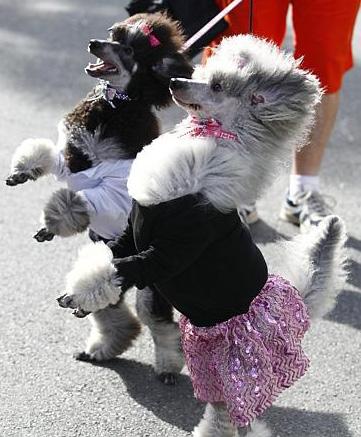
S Darling
strength and density. Bitches going through season or in pup will often drop coat and a colour change happens when new coat grows through. With browns and apricots, strong sunlight will bleach the coat.
The Poodle coat changes to a harsher, denser quality at around 10-12 months of age (Coat Change). During this period matting must be avoided in pet Poodles with daily brushing and by keeping the coat short. Show Poodles require frequent bathing, brushing and trimming during coat change. The adult plush quality coat lends itself to easy trimming. The true Poodle coat does not shed like other dogs and is said to be nonallergenic. These qualities (and others) can be lost by careless and cross breeding. VERSATILITY
Poodles are not only listed as the second smartest dog breed in the world, they are also one of the most versatile. The original breeding was designed to produce a guardian dog for the owners, as well as a hunting and water retrieving working dog venturing out onto lakes and waterways in European countries to work alongside their human retrieving water birds and other small game. As several poodles would often be out together, the owner devised a system of identifying their own dog coming out of the marsh covered in reeds, mud and water. This was done using coloured ties attached to the top of the head – hence the fashion and term “Topknot” was born.
As well as this ‘Topknot’, Poodles in those early days also sported a specific coat style – • full mane on chest, face showing some hair (often a short beard and moustache), • on each leg base a clump of coat roughly shorn and called a ‘Pom’ whose purpose is to protect the dogs hocks and help disperse the cold, • the top of front legs were shaved as were the rear top of the legs and back end, leaving only small rosettes on the back behind the mane to supposedly help protect the dog’s kidneys from cold extremes. • shaving the legs was to allow free swimming and stop entanglement in river or lake growth. This modern clip style called ‘Continental’ was due to the region it was originally used on the breed. These days the poodle can be seen in a variety of clips from pet styles for those as pets, to sports competitor poodles, with other elaborate styles for show dogs. There are recommended styles outlined in the show rules.
Today in some countries Miniature and Standard
Rachel Regan Photography
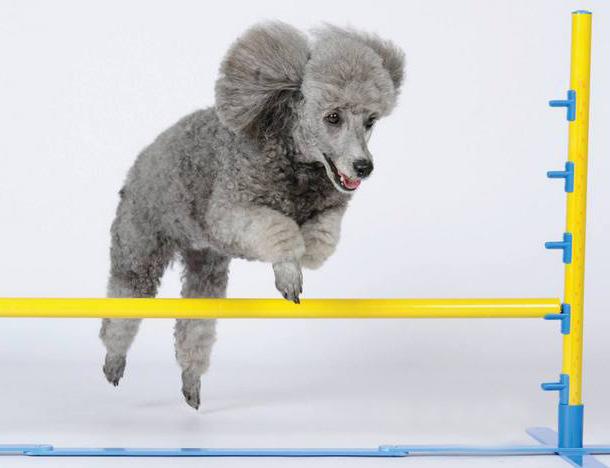
Steven Kerr – Rapid Dog Photography
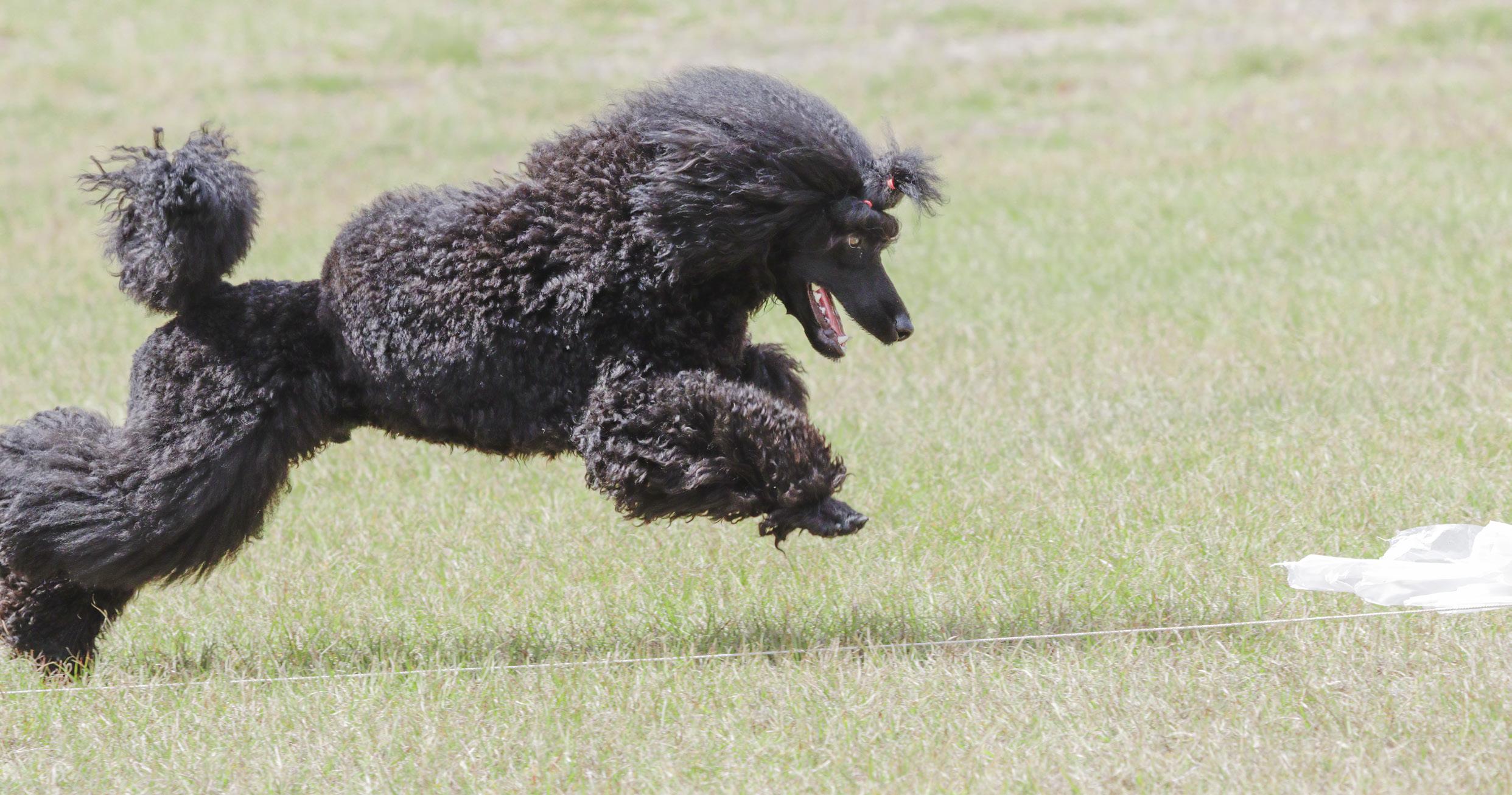
variety Poodles still compete in hunting trials with decoys. Many poodles compete in circus troupes, with owners entertaining and competing in the Dances with Dogs sporting discipline, Trick Dog competitions, Agility, Obedience, Rally O Trials, Lure Coursing, Tracking, Fly Ball, Disk Dog, Herding and some have gained their Endurance Titles. As well as being excellent working dogs for search and rescue, therapy/service dogs, there have been others trained as Guide Dogs.
The calm, intelligent, robust Poodle lends itself to many sporting pursuits or is just as happy to chill out on the couch with owner. A size for everyone!
If you desire a larger breed the Standard is the choice, however think carefully about how much car room you have, your bed size, and grooming costs as well as that time you might need to fly your dog somewhere. achieved. This size can do several of the dog sports, however they prefer to be a special member of the household.
ARE YOU THE IDEAL POODLE OWNER?
The ideal Poodle owner is a caring, sensible person who takes the responsibilities of owning a dog seriously and is willing to commit to regular grooming sessions. The Poodle owner must have the capacity to provide quality lifelong care including accommodation, coat care, feeding, exercise, training, health care (when required) and companionship. Poodles thrive on human companionship and do not do well if deprived of this companionship for extended periods of time on a regular basis.
THE POODLE CLUB OF QUEENSLAND INC.
The club was established in 1968 celebrating 50 years in 2018.
Open Shows are held each year in March and the Champion Show in September. Nationals are organised on a rotational basis in each state with the next to be held in Perth 2022. Fun days on the Southside (May) and Northside (September) are run to encourage pet owners to become involved. The club also manages a Poodle Rescue Rehome programme.

The Miniature size is by far the most popular and are just a smaller size down from the original Standard. The Toy size took a lot longer to create and there is some suggestion they do have a background of another breed as this size are obviously not water retrievers. They were depicted in many early European paintings and photographs as much loved lap dogs of the gentry of the day. The more fragile cousin of the larger Poodle is much more energetic and vocal. Careful breeding needs to be adhered to so conformity to their size and temperament is More information, including activities and breeder referrals, can be found on the club’s website www.poodleclubofqueenslandinc. com
Charlene Hills, President qpcpresident@yahoo.com.au Phone: 07 3343 4804 or 0407 151 339
Paula Morgan, Secretary qpcsecretary@yahoo.com.au Phone: 0414 501 707
Dog Sports – Scent Work
INTRODUCTION TO QLD FOUNDATION SCENT WORK JUDGES
Since the ANKC approval of the introduction of the new dog sport of Scent Work, the process of selecting and training Foundation Judges has been under way, under the direction of the ANKC National Scent Work Committee.
The training program for the Foundation Judges began in September and has been comprehensive, and tightly packed into a short period, with a view to these judges being assessed for accreditation in early 2021.
In Queensland, the National Scent Work Committee selected three trainee judges for the Foundation Judges’ Training Program – Debby Lamprecht and Mike Jeavons (both from the south-east corner) and Silke Weyland from Cairns. Debby Lamprecht is a very experienced Tracking and Track and Search judge who has taught Scent Work and scent theory throughout Queensland and New South Wales for many years. Mike Jeavons is an experienced professional detection dog trainer and handler and Silke is mentored by a detection dog handler/trainer in Cairns and has been running much sought-after Scent Work classes for more than 18 months. Both Mike and Silke compete in Tracking and Track and Search.
Judy Pillinger, Chairperson of the National Scent Work Committee, has congratulated the three trainee judges, not only on their excellent exam results, but also for the very high standard of their Search Evaluations and Supervisor Reports for practical sessions. Silke has not had the opportunity to work with other experienced Scent Work peers but has provided an incredible amount of video footage of her work. Debby and Mike have worked very well together, sharing resources and volunteers. Queensland should be very proud of the quality of their Foundation Judges.
The Judges’ Training Program involves extensive online studies, accompanied by practical work and assessments. The theory and practical assessments cover, amongst other things, understanding of the characteristics and movement of odour, environmental and other factors affecting the

CAIRNS INTERIOR SEARCH
CAIRNS CONTAINER SEARCH

placement of hides and the design of searches at each level (Novice, Advanced, Excellent and Masters), managing the search area and assessing the dog and handler team as they undertake the search.

A requirement of the Judges’ Training Program is to conduct a mock Scent Work Trial and undertake several practical assessments. To assist the Foundation Judges meet these practical requirements, both Pine Rivers Dog Training Club and the Cairns City Kennel Club conducted mock Scent Work Trials. The mock trials followed the Scent Work trialling structure, albeit not all elements (Interiors, Exteriors, Containers and Vehicles) were offered at all levels. Club members and friends involved in the two clubs’ Scent Work classes participated in the mock trials as competitors and assisted with stewarding. The mock trials provided the clubs, trainee judges and competitors great insights into the nuances of judging, conducting and competing in Scent Work Trials.

For each trainee, their theory and practical examinations are assessed independently by three assessors and submitted to the National Scent Work Committee for final accreditation which is expected to occur in approximately February 2021. From this time, clubs can commence conducting titling Scent Work Trials. The three Queensland Foundation judge trainees are indebted to the clubs, supervisors, handlers and their mentors on the NSWC who have supported them and look forward to furthering the development of this exciting sport in 2021 and beyond.
Special thanks to Dogs Queensland for their continued support, especially Director Barb Murfet for her assistance and direction in all aspects of the promotion of ANKC Scent Work.
CAIRNS PRESENTATIONS
DAYBORO PRESENTATIONS
Water – ABCs of poisons
– Animal Poisons Helpline Have you ever paid attention to your dog’s swimming technique? Watch your dog the next time they are swimming; do they jump or dive into the water, cause lots of splashing with their doggy paddle, hold their head too low in the water, swim with their mouth open or cough when they come out of the water? If so, their swimming style might make them more prone to water intoxication. Excessive voluntary water consumption is usually an indicator of an underlying medical condition and should be assessed by a veterinarian. However, there are circumstances where water is ingested unnecessarily and this can lead to water intoxication. Examples include dogs that have been swimming, especially if retrieving objects in the water, diving or chasing waves, and those that enjoy




To make a purchase call 3252 2661 or email barbara@dogsqueensland.org.au
• Transcervical insemination with fresh, chilled and frozen semen. • Semen collection and freezing. • In-house progesterone testing - results in 20 minutes. • Dog and bitch fertility assessment and much more.
Dr Scott Norman BVSc PhD DACT



Registered specialist - veterinary reproduction Dr Jennifer Larsen BVBiol BVSc Ph (07) 3204 4332
1474 Anzac Ave Kallangur 4503
playing in a stream of water from a hose or sprinkler. Swimming in rough water may also increase water ingestion.
Excess fresh water consumption lowers the sodium concentration of the blood; a condition called hyponatraemia. This leads to movement of the water into cells throughout the body. Most organs can cope ok with this swelling, but the brain cannot expand very much since it is encased in the bone of the skull. If brain swelling is severe or prolonged, irreversible brain damage may result.
Excess salt water consumption increases the sodium concentration in the blood; a condition called hypernatraemia. This leads to movement of water from inside cells into the blood, causing the cells to shrink. When this happens in the brain, the brain cells can separate from their myelin coating leading to reduced transmission of electrical signals. This results in permanent brain damage.
Early signs of water intoxication from either fresh or salt water ingestion include lethargy, vomiting, diarrhoea and/or bloating. Signs of brain dysfunction include weakness, confusion, loss of coordination, muscle tremors, seizures and coma. Water intoxication is a true medical emergency and veterinary treatment must be sought immediately to prevent permanent brain damage. Careful treatment with diuretics or low sodium fluids along with regular blood sodium monitoring is necessary to ensure brain function is preserved.
If your dog has a susceptible swimming style avoid throwing objects for them to retrieve or use a flat object to allow them to better hold their mouth closed. Consider the use of a dog life jacket/ floatation device to keep them higher in the water. If visiting the beach, even for a short period, always carry ample fresh water and a travel bowl with you. Offer your pooch a drink every 15 minutes; this will make them less likely to drink sea water and if they do, the fresh water should help to balance out the salt consumed.

Est 1977
“ HOT FOIL STAMPING SPECIALIST ” PHONE: ( 02 ) 47741809
EMAIL: marellen@marellenshowribbons.com ADDRESS: 109 Silverdale Rd Silverdale N.S.W. 2752
WEB: www.marellenshowribbons.com
“ FIND US ON FACEBOOK FOR FAST COMMUNICATION ”
The Animal Poisons Helpline is a registered charity that provides a free service for all pet owners. Visit www.animalpoisons.com.au for more information.












